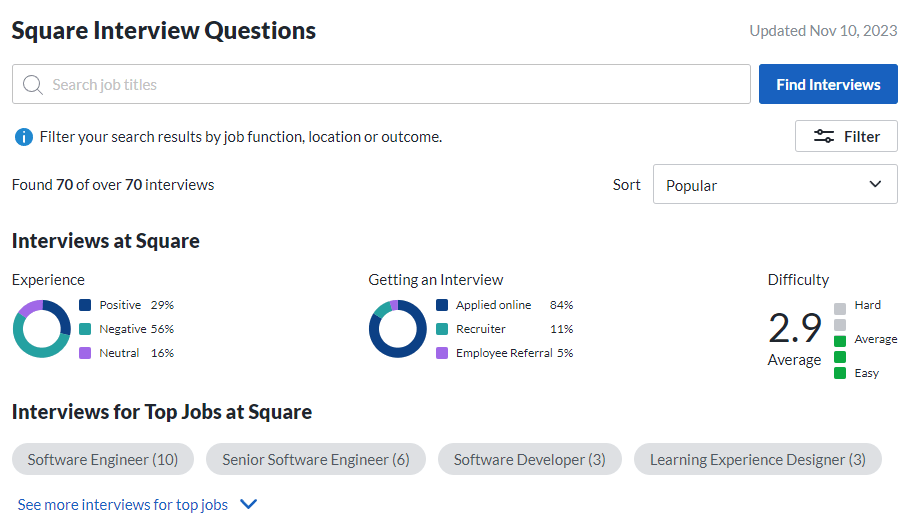Square’s Data Science Interview Process - A Complete Guide
Explore Square’s Data Science interview process with our complete guide, detailing each stage and essential preparation tips.

Square’s data science team has been growing rapidly to support the company’s increasing demands for data-driven solutions. For anyone looking to join the data science team, the interview process can seem daunting.
In this 4 Day Week blog, we'll break down the Square data science interview process to help you prepare for success. Gain insights from real interviewees and helpful tips to make sure you’re ready for each step.
So, let’s get started.
Square Hiring Process Overview
Square offers data scientists an engaging, dynamic environment to apply their skills across different areas in fintech. Square's interview process evaluates candidates on their technical skills and knowledge, with a focus on Python, SQL, R, and algorithms.

The Square hiring process includes an initial phone screen, a technical interview, and on-site interviews—nothing out of the ordinary. Most interviewees reported an average level of difficulty and a negative experience overall due to seemingly illogical interview requirements and formats.
What Do Square Interviewees Say About the Process?
Most interviewees (56%) report a negative experience with the Square interview process, but not usually because the process is overly challenging. Instead, people complained that the format didn’t always make sense and that it didn’t seem like it was set up to allow applicants to put their best foot forward.

Despite these negatives, Square's interviewers and recruiters receive praise for their kindness and clarity.
Square Data Science Interview Process Timeline
The entire hiring process at Square typically takes 4–6 weeks from initial application to decision. Interviews take up the majority of this time—there are 4 stages in total, each with a unique format, style, and duration.
Here’s a quick overview of what you can expect in terms of interview timelines and durations:
- Recruiter Phone Screen: 1–2 weeks after the application. The call may last up to 30 minutes.
- Technical Phone Screen: 1 week after phone screen. The call can take anywhere between 1–2 hours. Senior candidates may skip this step.
- Onsite Interview: 1–2 weeks after the technical screen. Consists of 4–6 rounds that typically last 30–60 minutes each.
- Hiring Bar Review: 1 week after the onsite interview.
Now, let's go over the specifics and things you could expect in each of these stages.
Square Data Science Interview Stages
Preparing for the Square Data Science interview stages involves understanding their unique challenges and expectations. Here we outline each phase, providing you with a roadmap to navigate this rigorous process successfully.
Stage 1: Phone Screen
In this first call, you’ll have to discuss your background, work experience, and interest in Square. Be prepared for questions about your passion for data science, and feel free to ask any questions you have about the position—companies like to know that you’re eager to learn.
Stage 2: Technical Phone Screen
Square's technical phone screen takes roughly 1–2 hours. During this interview, you'll work with your interviewer to solve a coding problem using CoderPad with the goal of evaluating your programming and problem-solving skills.
Expect two separate interviews:
- SQL Interview (~30 minutes): You’ll be asked questions about SQL, like how to write a query to join two tables.
- Python or R Interview (~45 minutes): You’ll be asked to write code in Python or R to solve a problem.
Following this round, your interviewer will provide overall feedback and share insights on your performance. This feedback might cover areas like your coding speed, attention to detail, aptitude, and more, but it probably won’t offer insight into whether you’ll progress to the next round.
Would you like a 4 day work week?
Stage 3: Onsite Interviews
Onsite interviews at Square include 4–6 sessions tailored to your role and experience level. Most interviews (except for the coding rounds) will involve two-person panels. For mid to senior-level data scientists and engineers, the onsite interview rounds typically look like this:
- Data Engineering & Exploration (60 minutes): This interview assesses your ability to explore and analyze a product dataset, design an aggregated table, and answer business questions.
- Statistics & ML (60 minutes): The interview evaluates your ML application skills, covering data processing, analysis, knowledge of ML algorithms, and performance evaluation.
- Operational Thinking (30 minutes): This interview focuses on A/B testing, statistical concepts, and your ability to inform product decisions based on test results.
- Influence & Collaboration (30 minutes): This interview assesses how you collaborate with various functions within a product team.
- Strategic Thinking (30 minutes): This interview assesses your approach to prioritization and open-ended projects.
- Leadership interview (60 minutes): This interview is specifically for L6+ candidates. At this stage, you’ll chat with the hiring manager about team dynamics and your ability to lead people.
Pass this gauntlet successfully, and your application and interview notes will be sent to the hiring bar for review.
How to Nail the Square Data Science Interview Process?
When you are preparing for a Square Data Science interview—here are some things to keep in mind:
1. Research Square’s Values and Mission
Dive deep into Square's work culture. Explore their company culture page for valuable insights into what makes Square unique. Understand their values, mission, and how they operate.
Additionally, extend your research beyond Square. Explore competitors in the industry. This can help you generate ideas that could give Square a competitive edge and be ready to discuss these during the interview.
2. Know Your Interviewer
Take the time to research your interviewer. Google them, check LinkedIn. Discover their professional background, contributions to open-source projects, or involvement in social organizations. Use this information to tailor your communication strategy.
3. Communicate Clearly
Articulate your thought process clearly. As you work through problems, provide insights into your approach and decision-making. This helps the interviewer understand your problem-solving skills.
When presenting findings or answering questions, be concise. Use the STAR (Situation, Task, Action, Result) Method to illustrate your points and provide a clear understanding of your experiences and thought process.
If any interview question is unclear, don't hesitate to seek clarification. It's better to ask questions than to make assumptions and provide incorrect answers. Clarifying ensures you address the interviewer's intent accurately.
4. Demonstrate Your Coding and Data Analysis Proficiency
Fully grasp the problem and the data provided. Take the time to understand the intricacies before devising an answer. A well-thought-out strategy is key to presenting effective solutions.
Also, practice coding exercises to make sure you're well-prepared for live coding sessions. Familiarize yourself with common data science problems and coding best practices.
20 Square Data Science Interview Questions
Aside from the typical “Why do you want to work at Block/Square?” question, here are other common questions you can expect during the interview process:
Technical Skills
- How would you approach building a predictive model to detect fraudulent transactions in Square's payment processing data?
- Can you explain the concept of recall and precision in the context of evaluating a machine learning model's performance for fraud detection?
- Describe a time when you used Python to analyze large datasets for insights relevant to financial services at Square.
- How would you design an SQL query to identify patterns of unusual activity in transaction data?
- What are some common algorithms used for anomaly detection in financial transaction data, and how would you choose the most suitable one for Square's needs?
Business Acumen and Analytics
- What metrics and KPIs would you consider important for evaluating the effectiveness of Square's financial risk management strategies?
- How would you use data analysis to optimize Square's product offerings and improve customer experience?
- Can you discuss a time when you leveraged data to provide actionable insights for decision-making in a financial services context?
- How do you stay updated with the latest trends and techniques in the data science field, particularly in relation to financial technology?
- What role do you think data science plays in driving innovation and growth in the financial services industry, and how would you apply this at Square?
Problem-Solving and Experimentation
- How would you design an experiment to test the effectiveness of a new feature in Square's payment processing platform using data analysis?
- Describe a challenging data science problem you encountered in a previous role and how you approached solving it.
- What steps would you take to handle ambiguity or uncertainty in your work as a data scientist at Square?
- Can you discuss a time when you used statistical modeling to derive actionable insights for optimizing business strategies in a financial services context?
- How would you communicate complex data-driven findings and insights to non-technical stakeholders at Square?
Team Collaboration and Communication
- How do you ensure effective collaboration and knowledge sharing within a cross-functional team environment?
- Can you provide an example of a successful project where you collaborated with other teams to achieve a data-driven business outcome?
- How do you approach presenting technical findings and insights to non-technical stakeholders at Square?
- Describe a time when you had to influence a decision or change based on your data analysis and insights.
- What strategies do you use to foster a culture of continuous learning and improvement within a data science team?
Wrapping Up
As a leading company in the payments space, Square's interview process is thorough, but with the right preparation, you can demonstrate your enthusiasm and skills to show that you would be an asset to the team.
Looking for data science positions at companies that value work-life balance?
At 4 Day Week, we help candidates find remote and hybrid data science job openings at companies with 4-day workweeks.
Enjoy more free time without taking a pay cut—start browsing the job openings today.